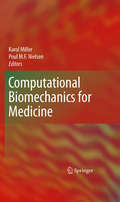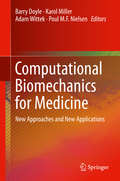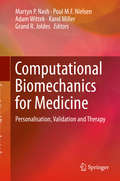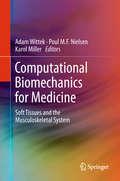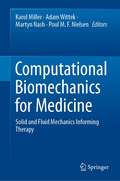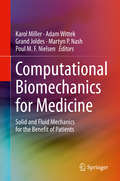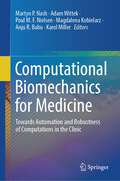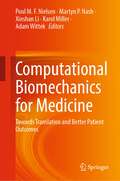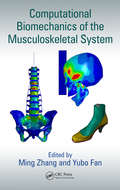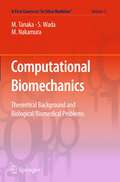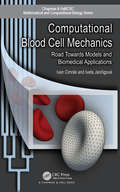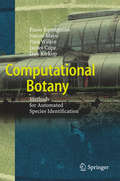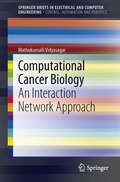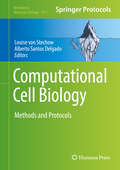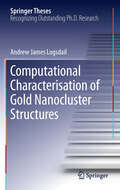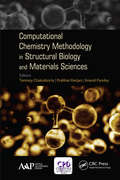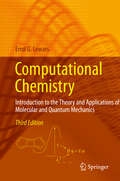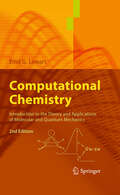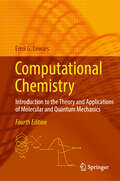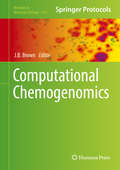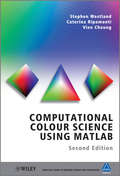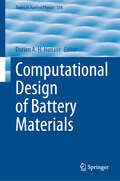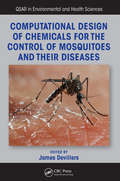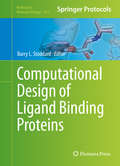- Table View
- List View
Computational Biomechanics for Medicine: Models, Algorithms And Implementation
by Poul M.F. Nielsen Karol MillerMathematical modelling and computer simulation have proved tremendously successful in engineering. One of the greatest challenges for mechanists is to extend the success of computational mechanics to fields outside traditional engineering, in particular to biology, biomedical sciences, and medicine. The proposed workshop will provide an opportunity for computational biomechanics specialists to present and exchange opinions on the opportunities of applying their techniques to computer-integrated medicine. For example, continuum mechanics models provide a rational basis for analysing biomedical images by constraining the solution to biologically reasonable motions and processes. Biomechanical modelling can also provide clinically important information about the physical status of the underlying biology, integrating information across molecular, tissue, organ, and organism scales. The main goal of this workshop is to showcase the clinical and scientific utility of computational biomechanics in computer-integrated medicine.
Computational Biomechanics for Medicine: New Approaches and New Applications
by Karol Miller Adam Wittek Barry Doyle Poul M. F. NielsenOne of the greatest challenges facing the computational engineering community is to extend the success of computational mechanics to fields outside traditional engineering, in particular to biology, the biomedical sciences and medicine. The Computational Biomechanics for Medicine series provides an opportunity for specialists in computational biomechanics to present their latest methodologies and advancements. This 5th edition comprises nine of the latest developments in both fundamental science and patient-specific applications, from researchers in Australia, New Zealand, USA, UK, France, Ireland and China. Some of the interesting topics discussed are: cellular mechanics; tumor growth and modeling; medical image analysis and both patient-specific fluid dynamics and solid mechanics simulations.
Computational Biomechanics for Medicine: Personalisation, Validation and Therapy
by Karol Miller Adam Wittek Poul M. F. Nielsen Grand R. Joldes Martyn P. NashThis book contains contributions from computational biomechanics specialists who present and exchange opinions on the opportunities for applying their techniques to computer-integrated medicine, including computer-aided surgery and diagnostic systems. Computational Biomechanics for Medicine collects peer-reviewed chapters from the annual Computational Biomechanics for Medicine Workshop, in conjunction with the Medical Image Computing and Computer Assisted Intervention [MICCAI] Society conference. The works are dedicated to research in the field of methods and applications of computational biomechanics to medical image analysis, image-guided surgery, surgical simulation, surgical intervention planning, disease diagnosis and prognosis, analysis of injury mechanisms, implant and prosthesis design, artificial organ design, and medical robotics. These chapters will appeal to a wide range of researchers and students within the fields of engineering and medicine, as well as those working in computational science.
Computational Biomechanics for Medicine: Soft Tissues and the Musculoskeletal System
by Poul M.F. Nielsen Karol Miller Adam WittekOne of the greatest challenges for mechanical engineers is to extend the success of computational mechanics to fields outside traditional engineering, in particular to biology, biomedical sciences, and medicine. The proposed workshop will provide an opportunity for computational biomechanics specialists to present and exchange opinions on the opportunities of applying their techniques to computer-integrated medicine. <P><P> Computational Biomechanics for Medicine: Soft Tissues and the Musculoskeletal System collects the papers from the Medical Image Computing and Computer Assisted Intervention conference (MICCAI 2010) in Beijing, dedicated to research in the field of medical image computing and computer assisted medical interventions. The topics covered include: medical image analysis, image-guided surgery, surgical simulation, surgical intervention planning, disease prognosis and diagnostics, injury mechanism analysis, implant and prostheses design, medical robotics.
Computational Biomechanics for Medicine: Solid and Fluid Mechanics Informing Therapy
by Karol Miller Adam Wittek Poul M. F. Nielsen Martyn NashComputational Biomechanics for Medicine: Solid and fluid mechanics for the benefit of patients contributions and papers from the MICCAI Computational Biomechanics for Medicine Workshop help in conjunction with Medical Image Computing and Computer Assisted Intervention conference (MICCAI 2020) in Lima, Peru. The content is dedicated to research in the field of methods and applications of computational biomechanics to medical image analysis, image-guided surgery, surgical simulation, surgical intervention planning, disease prognosis and diagnostics, analysis of injury mechanisms, implant and prostheses design, as well as artificial organ design and medical robotics. This book appeals to researchers, students and professionals in the field.
Computational Biomechanics for Medicine: Solid and Fluid Mechanics for the Benefit of Patients
by Karol Miller Adam Wittek Poul M. F. Nielsen Grand Joldes Martyn P. NashComputational Biomechanics for Medicine: Solid and fluid mechanics for the benefit of patients contributions and papers from the MICCAI Computational Biomechanics for Medicine Workshop help in conjunction with Medical Image Computing and Computer Assisted Intervention conference (MICCAI 2019) in Shenzhen, China. The content is dedicated to research in the field of methods and applications of computational biomechanics to medical image analysis, image-guided surgery, surgical simulation, surgical intervention planning, disease prognosis and diagnostics, analysis of injury mechanisms, implant and prostheses design, as well as artificial organ design and medical robotics. These proceedings appeal to researchers, students and professionals in the field.
Computational Biomechanics for Medicine: Towards Automation and Robustness of Computations in the Clinic
by Karol Miller Adam Wittek Poul M. F. Nielsen Martyn P. Nash Magdalena Kobielarz Anju R. BabuThis book presents contributions from the MICCAI 2022 Computational Biomechanics for Medicine Workshop. "Computational Biomechanics for Medicine - towards translation and better patient outcomes” comprises papers accepted for the MICCAI Computational Biomechanics for Medicine Workshop held in 2022 in Singapore. The content focuses on applications of computational biomechanics to computer-integrated medicine, which includes MICCAI topics of Medical Image Computing, Computer-Aided Modeling and Evaluation of Surgical Procedures, and Imaging, Analysis Methods for Image Guided Therapies, Computational Physiology, and Medical Robotics. Specific topics covered include medical image analysis, image-guided surgery, surgical simulation, surgical intervention planning, disease prognosis and diagnostics, analysis of injury mechanisms, implant and prostheses design, as well as artificial organ design and medical robotics. This book details state-of-the-art progress in the above fields to researchers, students, and professionals.
Computational Biomechanics for Medicine: Towards Translation and Better Patient Outcomes
by Karol Miller Adam Wittek Poul M. F. Nielsen Martyn P. Nash Xinshan LiThis book presents contributions from the MICCAI 2021 Computational Biomechanics for Medicine Workshop. "Computational Biomechanics for Medicine - towards translation and better patient outcomes” comprises papers accepted for the MICCAI Computational Biomechanics for Medicine Workshop held virtually in conjunction with Medical Image Computing and Computer Assisted Intervention conference 2021, based in Strasbourg. The content focuses on methods and applications of computational biomechanics to medical image analysis, image-guided surgery, surgical simulation, surgical intervention planning, disease prognosis and diagnostics, analysis of injury mechanisms, implant and prostheses design, as well as artificial organ design and medical robotics. This book details state-of-the-art progress in the above fields to researchers, students, and professionals.
Computational Biomechanics of the Musculoskeletal System
by Ming Zhang Yubo FanComputational biomechanics is an emerging research field that seeks to understand the complex biomechanical behaviors of normal and pathological human joints to come up with new methods of orthopedic treatment and rehabilitation.Computational Biomechanics of the Musculoskeletal System collects the latest research and cutting-edge techniques used in
Computational Biomechanics: Theoretical Background and Biological/Biomedical Problems (A First Course in “In Silico Medicine” #3)
by Masao Tanaka Shigeo Wada Masanori NakamuraRapid developments have taken place in biological/biomedical measurement and imaging technologies as well as in computer analysis and information technologies. The increase in data obtained with such technologies invites the reader into a virtual world that represents realistic biological tissue or organ structures in digital form and allows for simulation and what is called "in silico medicine." This volume is the third in a textbook series and covers both the basics of continuum mechanics of biosolids and biofluids and the theoretical core of computational methods for continuum mechanics analyses. Several biomechanics problems are provided for better understanding of computational modeling and analysis. Topics include the mechanics of solid and fluid bodies, fundamental characteristics of biosolids and biofluids, computational methods in biomechanics analysis/simulation, practical problems in orthopedic biomechanics, dental biomechanics, ophthalmic biomechanics, cardiovascular biomechanics, hemodynamics, cell mechanics, and model-, rule-, and image-based methods in computational biomechanics analysis and simulation. The book is an excellent resource for graduate school-level engineering students and young researchers in bioengineering and biomedicine.
Computational Blood Cell Mechanics: Road Towards Models and Biomedical Applications (Chapman & Hall/CRC Computational Biology Series)
by Ivan Cimrak Iveta JancigovaSimulating blood cells for biomedical applications is a challenging goal. Whether you want to investigate blood flow behavior on the cell scale, or use a blood cell model for fast computational prototyping in microfluidics, Computational Blood Cell Mechanics will help you get started, and show you the path forward. The text presents a step-by-step approach to cell model building that can be adopted when developing and validating models for biomedical applications, such as filtering and sorting cells, or examining flow and deformations of individual cells under various conditions. It starts with basic building-blocks that, together, model the red blood cell membrane according to its physical properties, before moving on to discuss several issues that may pose problems along the way, and finally leads to suggestions on how to set up computational experiments. More details available at www.compbloodcell.eu
Computational Botany: Methods for Automated Species Identification
by Paul Wilkin Simon Mayo Paolo Remagnino James Cope Don KirkupThis book discusses innovative methods for mining information from images of plants, especially leaves, and highlights the diagnostic features that can be implemented in fully automatic systems for identifying plant species. Adopting a multidisciplinary approach, it explores the problem of plant species identification, covering concepts in both taxonomy and morphology. An overview of morphometrics includes historical background and the main steps in the morphometric analysis of leaves together with a number of applications. The core of the book focuses on novel diagnostic methods for plant species identification developed from the perspective of a computer scientist. It concludes with a chapter on the characterization of botanists' vision, highlighting important cognitive aspects that can be implemented in a computer system so as to replicate more accurately the human expert's fixation process. The book not only represents an authoritative guide to advanced computational tools for plant identification, but offers new ideas and challenges to experts in botany, computer science and pattern recognition. It should help to foster closer collaboration and further technological developments in the emerging field of automatic plant identification.
Computational Cancer Biology: An Interaction Network Approach (SpringerBriefs in Electrical and Computer Engineering)
by Mathukumalli VidyasagarThis brief introduces people with a basic background in probability theory to various problems in cancer biology that are amenable to analysis using methods of probability theory and statistics. The title mentions "cancer biology" and the specific illustrative applications reference cancer data but the methods themselves are more broadly applicable to all aspects of computational biology. Aside from providing a self-contained introduction to basic biology and to cancer, the brief describes four specific problems in cancer biology that are amenable to the application of probability-based methods. The application of these methods is illustrated by applying each of them to actual data from the biology literature. After reading the brief, engineers and mathematicians should be able to collaborate fruitfully with their biologist colleagues on a wide variety of problems.
Computational Cell Biology: Methods and Protocols (Methods in Molecular Biology #1819)
by Louise Von Stechow Alberto Santos DelgadoThis volume details computational techniques for analyses of a wide range of biological contexts, providing an overview of the most up-to-date techniques used in the field. Chapters guide the reader through available data resources and analysis methods and easy-to-follow protocols that allow the researcher to apply various computational tools to an array of different data types. Written in the highly successful Methods in Molecular Biology series format, chapters include introductions to their respective topics, lists of the necessary materials and reagents, step-by-step, readily reproducible laboratory and computational protocols, and tips on troubleshooting and avoiding known pitfalls. Authoritative and cutting-edge, Computational Cell Biology: Method and Protocols aims to ensure successful results in the further study of this vital field.
Computational Characterisation of Gold Nanocluster Structures (Springer Theses)
by Andrew James LogsdailIn this thesis, Andrew Logsdail demonstrates that computational chemistry is a powerful tool in contemporary nanoscience, complementing experimental observations and helping guide future experiments. The aim of this particular PhD is to further our understanding of structural and compositional preferences in gold nanoparticles, as well as the compositional and chemical ordering preferences in bimetallic nanoalloys formed with other noble metals, such as palladium and platinum. Highlights include: calculations of the structural preferences and optical-response of gold nanoparticles and gold-containing nanoalloys; the design and implementation of novel numerical algorithms for the structural characterisation of gold nanoparticles from electron microscopy images; and electronic structure calculations investigating the interaction of gold nanoparticles with graphene and graphite substrates. The results presented here have significant implications for future research on the chemical and physical properties of gold-based nanoparticles and are of interest to many researchers working on experimental and theoretical aspects of nanoscience.
Computational Chemistry Methodology in Structural Biology and Materials Sciences
by Tanmoy Chakraborty, Prabhat Ranjan and Anand PandeyComputational Chemistry Methodology in Structural Biology and Materials Sciences provides a selection of new research in theoretical and experimental chemistry, focusing on topics in the materials science and biological activity. Part 1, on Computational Chemistry Methodology in Biological Activity, of the book emphasizes presents new developments in the domain of theoretical and computational chemistry and its applications to bioactive molecules. It looks at various aspects of density functional theory and other issues. Part 2, on Computational Chemistry Methodology in Materials Science, presents informative new research on computational chemistry as applied to materials science. The wide range of topics regarding the application of theoretical and experimental chemistry and materials science and biological domain will be valuable in the context of addressing contemporary research problems.
Computational Chemistry: Introduction to the Theory and Applications of Molecular and Quantum Mechanics
by Errol G. LewarsThis is the third edition of the successfultext-reference book that covers computational chemistry. It features changes tothe presentation of key concepts and includes revised and new material withseveral expanded exercises at various levels such as 'harder questions' forthose ready to be tested in greater depth -this aspect is absent from other textbooks in the field. Although introductoryand assuming no prior knowledge of computational chemistry, it covers theessential aspects of the subject. There are several introductory textbooks oncomputational chemistry; this one is (as in its previous editions) aunique textbook in the field with copious exercises(and questions) and solutions with discussions. Noteworthy is the fact that itis the only book at the introductory level that shows in detail yet clearly howmatrices are used in one important aspect of computational chemistry. Italso serves as an essential guide forresearchers, and as a reference book.
Computational Chemistry: Introduction to the Theory and Applications of Molecular and Quantum Mechanics
by Errol G. LewarsThis corrected second edition contains new material which includes solvent effects, the treatment of singlet diradicals, and the fundamentals of computaional chemistry. "Computational Chemistry: Introduction to the Theory and Applications of Molecular and Quantum Mechanics" is an invaluable tool for teaching and researchers alike. The book provides an overview of the field, explains the basic underlying theory at a meaningful level that is not beyond beginners, and it gives numerous comparisons of different methods with one another and with experiment. The following concepts are illustrated and their possibilities and limitations are given: - potential energy surfaces; - simple and extended Hueckel methods; - ab initio, AM1 and related semiempirical methods; - density functional theory (DFT). Topics are placed in a historical context, adding interest to them and removing much of their apparently arbitrary aspect. The large number of references, to all significant topics mentioned, should make this book useful not only to undergraduates but also to graduate students and academic and industrial researchers.
Computational Chemistry: Introduction to the Theory and Applications of Molecular and Quantum Mechanics
by Errol G. LewarsThis is the fourth edition of the successful textbook on computational chemistry which continues to provide a comprehensive introduction to the theory and practice of computational chemistry. Notable updates include a review of references up to mid-2023, encompassing recent developments in scientific journals, books, and software. The evolving prominence of density functional theory (DFT) is emphasized, and attention is given to the increasing application of artificial intelligence in computational chemistry. The book maintains key features from the previous edition, delving into the mathematical intricacies of ab initio and density functional methods at an introductory level. Clear explanations of matrix methods are provided, offering a direct approach to obtaining energy levels and molecular orbitals. Additionally, each chapter includes sets of "Easier" and "Harder" drill questions, with suggested answers at the end of the book, enhancing the learning experience. The book is intended for upper-year undergraduate and graduate students studying computational and theoretical chemistry and for self-study by researchers in universities and industry to whom computational chemistry may be useful.
Computational Chemogenomics (Methods in Molecular Biology #1825)
by J. B. BrownThis thorough book provides a collection of techniques used in the emerging field of computational chemogenomics, which is an integration of chemoinformatics, bioinformatics, computer science, statistics, automated pattern recognition and modeling, database usage with data retrieval, and systems integration. Beginning with a section on public chemogenomic data resources, the volume continues by delving into the fundamentals of chemoinformatics, bioinformatics, and chemogenomic data processing. After the reader is comfortable with a core skillset, the volume introduces techniques to analyze specific proteins or compound structures and statistical pattern recognition techniques. Later chapters describe the future of chemogenomics including applications to medical care. Written for the highly successful Methods in Molecular Biology series, chapters include the kind of detailed implementation advice that serves as an ideal guide in the lab. Practical and authoritative, Computational Chemogenomics will greatly aid experimental sciences who are novices to data processing and modeling, as well as those with computationally-oriented backgrounds wishing to engage in this scientific area, which is continually growing and expected to contribute to industry, academic, and government research projects.
Computational Colour Science Using MATLAB
by Caterina Ripamonti Vien Cheung Stephen WestlandComputational Colour Science Using MATLAB 2nd Edition offers a practical, problem-based approach to colour physics. The book focuses on the key issues encountered in modern colour engineering, including efficient representation of colour information, Fourier analysis of reflectance spectra and advanced colorimetric computation. Emphasis is placed on the practical applications rather than the techniques themselves, with material structured around key topics. These topics include colour calibration of visual displays, computer recipe prediction and models for colour-appearance prediction.Each topic is carefully introduced at three levels to aid student understanding. First, theoretical ideas and background information are discussed, then explanations of mathematical solutions follow and finally practical solutions are presented using MATLAB. The content includes:A compendium of equations and numerical data required by the modern colour and imaging scientist.Numerous examples of solutions and algorithms for a wide-range of computational problems in colour science.Example scripts using the MATLAB programming language.This 2nd edition contains substantial new and revised material, including three innovative chapters on colour imaging, psychophysical methods, and physiological colour spaces; the MATLAB toolbox has been extended with a professional, optimized, toolbox to go alongside the current teaching toolbox; and a java toolbox has been added which will interest users who are writing web applications and/or applets or mobile phone applications.Computational Colour Science Using MATLAB 2nd Edition is an invaluable resource for students taking courses in colour science, colour chemistry and colour physics as well as technicians and researchers working in the area. In addition, it acts a useful reference for professionals and researchers working in colour dependent industries such as textiles, paints, print & electronic imaging.Review from First Edition:"...highly recommended as a concise introduction to the practicalities of colour science..." (Color Technology, 2004)
Computational Continuum Mechanics
by Ahmed A. ShabanaThis updated text presents the theory of continuum mechanics using computational methods. The text covers a broad range of topics including general problems of large rotation and large deformations and the development and limitations of finite element formulations in solving such problems. Dr. Shabana introduces theories on motion kinematics, strain, forces, and stresses, and goes on to discuss linear and nonlinear constitutive equations, including viscoelastic and plastic constitutive models. General nonlinear continuum mechanics theory is used to develop small and large finite element formulations which correctly describe rigid body motion for use in engineering applications. This second edition features a new chapter that focuses on computational geometry and finite element analysis. This book is ideal for graduate and undergraduate students, professionals, and researchers who are interested in continuum mechanics.
Computational Design of Battery Materials (Topics in Applied Physics #150)
by Dorian A. H. HanaorThis book presents an essential survey of the state of the art in the application of diverse computational methods to the interpretation, prediction, and design of high-performance battery materials. Rechargeable batteries have become one of the most important technologies supporting the global transition from fossil fuels to renewable energy sources. Aided by the growth of high-performance computing and machine learning technologies, computational methods are being applied to design the battery materials of the future and pave the way to a more sustainable energy economy. In this contributed collection, leading battery material researchers from across the globe share their methods, insights, and expert knowledge in the application of computational methods for battery material design and interpretation. With chapters featuring an array of computational techniques applied to model the relevant properties of cathodes, anodes, and electrolytes, this book provides the ideal starting point for any researcher looking to integrate computational tools in the development of next-generation battery materials and processes.
Computational Design of Chemicals for the Control of Mosquitoes and Their Diseases (QSAR in Environmental and Health Sciences)
by James DevillersThere is a compelling need for new drugs and efficient treatments against mosquito-borne diseases. Environmentally safe, but effective insecticides that address the problems of resistance are required. Computational Design of Chemicals for the Control of Mosquitoes and Their Diseases explains how the search for new substances effective against mosquitoes and their diseases has benefited from the use of in silico techniques. QSAR modeling is suited to identify the key structural features and/or physicochemical properties explaining an activity and to propose candidate molecules for further evaluation by laboratory tests. Homology modeling is useful to approximate the 3D structure of proteins of interest. Pharmacophore modeling is a powerful means to capture the chemical features responsible for an activity and to identify new potentially active compounds via the virtual screening of databases. Fugacity modeling and a wealth of other modeling paradigms are useful for risk assessment in vector borne disease control.
Computational Design of Ligand Binding Proteins (Methods in Molecular Biology #1414)
by Barry L. StoddardThis volume provides acollection of protocols and approaches for the creation of novel ligand bindingproteins, compiled and described by many of today's leaders in the field ofprotein engineering. Chapters focus on modeling protein ligand bindingsites, accurate modeling of protein-ligand conformational sampling, scoring ofindividual docked solutions, structure-based design program such as ROSETTA,protein engineering, and additional methodological approaches. Examples of applicationsinclude the design of metal-binding proteins and light-induced ligand bindingproteins, the creation of binding proteins that also display catalyticactivity, and the binding of larger peptide, protein, DNA and RNAligands. Written in the highly successful Methods in MolecularBiology series format, chapters include introductions to theirrespective topics, lists of the necessary materials and reagents, step-by-step,readily reproducible laboratory protocols, and tips on troubleshooting and avoidingknown pitfalls.
